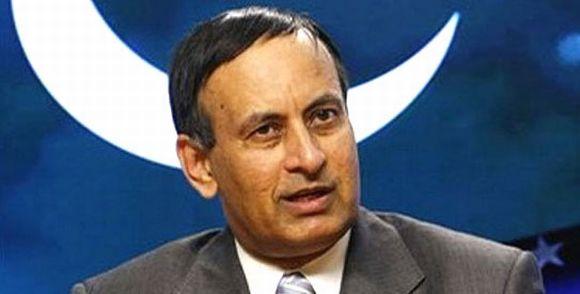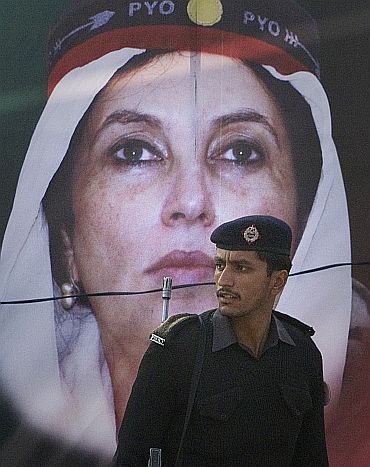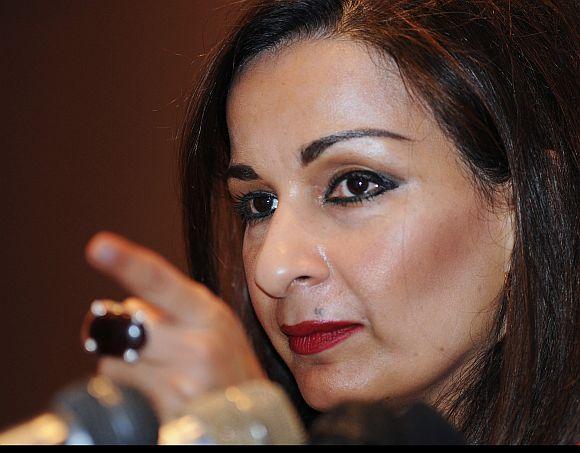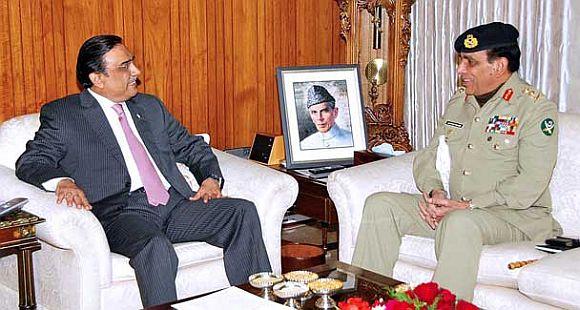
Aziz Haniffa finds out why few people are upset about the Pakistani ambassador's ouster and what the outlook on his successor is.
Erstwhile Pakistani ambassador to the United States, Husain Haqqani's contempt for the Pakistani military and the Inter-Services Intelligence was legendary and documented in his book Pakistan: Between Mosque and Military.
During General Pervez Musharraf's reign, Haqqani lived in virtual exile in the US, because there was a strong likelihood that he would have been killed in Pakistan for all the scathing reports he had written for newspapers and the speeches he had delivered, slamming the military regime and Musharraf.
He had a fellowship at the Carnegie Endowment for International Peace, a Washington, DC think tank, and when the fellowship expired — since Musharraf was still in charge — he landed a teaching assignment at Boston University's international relations department.
When slain former Pakistani prime minster Benazir Bhutto's husband Asif Ali Zardari came to power as the head of a civilian government in Islamabad, Haqqani was appointed Pakistan's ambassador to the US.
He quickly developed a high profile, speaking at think tanks and universities and becoming a regular feature on television, particularly on Wolf Blitzer's Situation Room on CNN. But he grew unpopular in think tank circles, the administration and even diplomatic circles.
...

A senior administration official, who did not want to be identified, told India Abroad, "The problem with Husain was that he thought he was too smart and that others were naive."
But if there was no love lost where Haqqani was concerned, the distaste that policy wonks and others had for Pakistani American businessman Mansoor Ijaz was much greater. Ijaz won the confidence of several Clinton administration officials using his friendship with former Central Intelligence Agency director James Woolsey, who had once been his neighbour, building up a profile as a troubleshooter in the world's trouble spots, including attempts to resolve the Kashmir imbroglio.
What has policy wonks and others wondering is how Haqqani could have trusted Ijaz and implicated himself with e-mail and text messages that led to the Memogate controversy and ultimately his firing.
Teresita C Schaffer, who has over three decades of serving in South Asia, said, "The amazing thing is that the coverage of this sorry episode has entirely focused on Haqqani and not on Ijaz, who acknowledges being the person who got the memo to Admiral (Mike) Mullen. Ijaz has a long history of exaggerating his role in similar conspiratorial ventures and representing himself, I believe incorrectly, as some kind of secret negotiator."
She said it was only Haqqani who was naive: "If anyone was being a naive freelance operator, I'd put my money on Ijaz."
Lisa Curtis, former South Asia analyst, CIA, and now head, South Asia division, Heritage Foundation, said, "There are many questions about the Ijaz affair that remain unanswered. Haqqani's biggest mistake may have been to have any contact at all with someone as controversial as Ijaz, who apparently was strongly mistrusted by the late Benazir Bhutto and who is viewed as unreliable by many US-based Pakistan experts."
...

"It is unclear why former national security advisor Jim Jones would have passed a memo from Ijaz on to Admiral Mullen and it is also unclear why Ijaz was so eager to boost the military and trash the civilian government when he has been so viciously critical of the ISI and Pakistani military in his writings and television interviews. The story does not fully add up. From what we know so far, there is still the possibility that Haqqani was set up by Ijaz," Curtis said.
She added, "Haqqani was a highly competent and respected ambassador and helped keep US-Pakistan relations from imploding when tensions seemed to reach unprecedented levels, particularly over Pakistan's continued support to Afghan insurgents fighting coalition soldiers in Afghanistan. He had the confidence of senior US officials and Congressional members and was able to explain and represent Pakistan's position effectively to a diverse set of policy circles in Washington."
Curtis believes Haqqani's successor "has big shoes to fill," but Sherry Rehman may "be up to the task."
She said, "Sherry is a slightly lesser known quantity in Washington, but she has gained respect for her dogged commitment to promoting democratic principles in Pakistan and her courageous efforts to speak out against religious extremism. She also gained high marks in Washington for her steady handling of the aftermath of the 2008 Mumbai attacks.
"As a key cabinet member in charge of the information ministry, she contributed to tamping down the situation and helped de-escalate tensions between India and Pakistan. Given the importance of the Indo-Pakistani dialogue to rooting out extremism and terrorism from South Asia, Sherry's appointment will be seen as a hopeful sign for ties between the regional rivals."
Curtis said Rehman's appointment appears to "bode well for the future of democracy in Pakistan," but warned "that the Ijaz-Haqqani episode will have strong negative reverberations for civil-military relations in Pakistan. Either Haqqani instigated and directed the Ijaz memo — which Haqqani firmly denies — or he was somehow set up by Ijaz. Both scenarios lead to heightening suspicions between the civilian and military leadership."
...

"These internal upheavals in Pakistan occur at a time when US frustration with Pakistani policies toward Afghanistan is at an all-time high. US policymakers see the Ijaz-Haqqani episode as a distraction from the real challenges inside Pakistan, which are coping with the insurgent and terrorist groups that threaten both Pakistani citizens and the global community," she said.
Former career diplomat Walter Andersen, who served several stints in South Asia, and was the chief of the South Asia department in the State Department's Bureau of Intelligence Research for decades, said, "The 'Memogate' issue itself has little to do with Pakistan-US relations. It is caused by differences in Pakistani politics. While little has been proved definitely about what happened, the issue has raised essential issues of military/civil relations in Pakistan and is linked to it. The military has taken control of all aspects of security, including relations with India, Afghanistan and the US."
Andersen, now associate director, South Asia Program, Johns Hopkins University's School of Advanced International Studies, spoke of how Zardari "has had to pull back on several issues in which he proposed a new way at looking at issues when the military growled, such as putting Kashmir on a backburner, shifting the ISI from the military to civilian control, and rejecting the option of a first nuclear strike. There is no doubt that the military has put major constraints on an elected government and it clearly intends to maintain this supremacy, and here is the core of the 'Memogate' issue."
He said, "It has received amazingly high military attention and there are reliable reports that the ISI chief, General Pasha, met Ijaz for a long meeting to find out what happened. The fact that Haqqani felt he had to resign underscores his recognition of the military's sense that its control over security affairs could be at stake.
Also, Haqqani's public statement that Ijaz's going public with all this has undermined political stability in Pakistan may be factually true, but this comment masks what is surely Haqqani's view that the military has far too much power."
Andersen considers Rehman a "terrific" successor to Haqqani, who he called a "superb representative of Pakistan in the US."
He said, "She has built a well-deserved reputation as an outspoken defender of the rights of vulnerable religious minorities in Pakistan, of a free press and an equally outspoken opponent of radicalism in any form. She established the Jinnah Institute in Pakistan to give her a forum to voice often controversial stands in favor of vulnerable groups. She is, in my view, a person who represents the best of what Pakistan could become."
He added, "She comes to the US at a difficult time in the relations of our two countries. Like her predecessor, she has a reputation of a strong defender of democracy and civilian control of the democratic process. Also, like her predecessor, she can legitimately speak out for human rights in her country. But also like her predecessor, she must be careful in expressing her views on civil military relations in her new role as ambassador. From the perspective of the military, which will continue to be the major voice on all security issues in Pakistan, and that includes relations with the US, Rehman will, in my opinion, be able to be a more forceful interlocutor with Islamabad that her predecessor."
Andersen is confident that Rehman "will not only represent the interests in her country very well, but seek in her own way to strengthen the democratic process in Pakistan and the rights of minorities. I suspect that she will be a factor in improving the Indo-Pakistani relationship, a relationship that now shows signs of improvement."